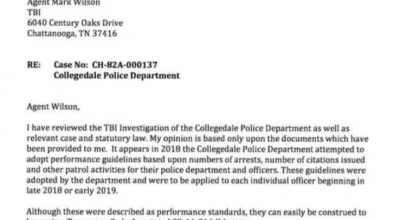
The public road and the public right of way and free movement are important concepts in the project to overturn Jim Crow traffic stops in Tennessee.
Roads are established for the benefit of the “traveling public,” to use a word found many times in Tennessee law. The law envisions that free movement of the people is an essential part of liberty in Tennessee.
By David Tulis / NoogaRadio 92.7 FM
Court cases and the statutes at Title 54, establishment of public roads, give hint about the liberty we have a right to expect in using the roads in our private cars and trucks. While not definitive in establishing a right of free travel and communication, these evidences suggest we are not amiss in finding fresh ways to overturn the state’s long abuse of the people with the aid of the bar and the courts.
The roads also serve the economy in inviting their use by freight, hauling or and other business interests that allow the marketplace to function efficiently and prosperously.
Jim Crow operates outside the scope of Tennessee law and is imposed upon African- Americans, the poor, immigrants and everybody else by law enforcement agencies such as Chattanooga police department and Hamilton County sheriff’s department, as in the state’s other 94 counties.
Here are important points in Title 54, the state highways, bridges and ferries law.
➤ “The fact that a highway is used chiefly by a private individual and is opened and maintained at his private expense does not make it a private highway where the statute declares it public and the whole public has the right to use the way.” Bashor v. Bowman, 133 Tenn. 269, 180 S.W. 326, 1915 Tenn. LEXIS 92 (1915).
➤ “We are of opinion that there is no ambiguity about the ordinary meaning of the expression ‘public highway.’ We think there can be no doubt that the common understanding of a public highway is such a passageway as any and all members of the public have an absolute right to use as distinguished from a permissive privilege of using same.” Standard Life Ins. Co. v. Hughes, 203 Tenn. 636, 315 S.W.2d 239, 1958 Tenn. LEXIS 229 (1958).
➤ “The roads belong to the public, and the county court holds them in trust for the public, and while it is proprietor for the purposes of its trust, it is not proprietor in the sense that it is owner of the roads against the public, or any member thereof. The public road is a way open to all the people, without distinction, for passage and repassage at their pleasure.” Sumner County v. Interurban Transp. Co., 141 Tenn. 493, 213 S.W. 412, 1918 Tenn. LEXIS 112, 5 A.L.R. 765 (1919).
➤ A gate can be put across a road only if “it will be manifestly to the advantage of the applicant and not materially to the prejudice of the public” that freely travels thereon. Tenn. Code Ann. § 54-10-108. Gates across roads.
➤ Movement on roads should not be impeded. One provision of the law prohibits blocking the road with objects or materials that would “render it inconvenient or hurtful to the traveling public, or who may encroach upon the highway in constructing any fence, wall, or like improvement, commits a class C misdemeanor.” Tenn. Code Ann. § 54-10-110.
For officials to block traffic and close any road requires at least 5 days notice to all interested parties. Tenn. Code Ann. § 54-10-to 02
Special grand jury created for ‘right of way’
Tennessee law creates a special grand jury called jury of view which is charged with determining rights of way to landlocked properties and Changing or closing of a public highway. Tenn. Code Ann. § 54-10-204
In the case Daniel B. BARGE III v. Earl H. SADLER, et al., No. M1999-01923-SC-R11-CV decided March 01, 2002, the high court says that people with landlocked property have a way to gain access to a public road through easement.
The concept of easement is that of a public road — again, a way useable freely by the public.
Roadways are created by voluntary donation of land, sale or eminent domain. The state’s obtaining of a road is always for the benefit of the traveling public, according to transportation administrative notice Tennessee.
The latter compulsory method relies on the public benefit as the rationale for an action of condemnation and seizure. A public benefit means a public use, the use of which is free and open.
Easements & how rights-of-way become roads
The Barge ruling from 2002 explains the process of how a road or easement is carved out from private lands. The point to remember is that an easement is a use, a free activity on that piece of road, and cannot be claimed by the state as a direct owner compelling people to obtain a privilege for the use of that piece of road or right of way or easement. That’s the point.
The following three paragraphs are from the judges’ opinion.
As a result of the nearly nonexistent need for roads, land was divided without regard for roadway access, and people frequently moved to unsettled, remote areas where no access to a public roadway was available by grant or deed. Id. Under the early common law, as the need arose for the right to cross another’s property, landlocked property owners were, in limited circumstances, granted the right to use the land of another for this special purpose. 3 James Kent, Commentaries on American Law, 608 (12th ed. 1884). The interest in the adjoining land was commonly referred to as an easement. Id. Generally, the common law limited this relief to situations in which past unity of title, obvious trespassory use, or public necessity was established. See Mahlon L. Townsend, Comment, Easements in Tennessee, 24 Tenn. L.Rev. 219, 224-35 (1956).
Eventually, the use of public roads increased. See Kalo, supra, at 1957-58. Recognizing that a lack of access to public roads denies a citizen the right to use his or her property effectively,2 lawmakers enacted statutes which established a procedure whereby private individuals could condemn land for easements extending from their landlocked property to a public road.3 Id. These statutes recognized necessity as justification for an easement even where the common law requirements were not met. Restatement (Third) of Property § 2.15 cmt. a (1989). Thus, the statutory law provided “a broader solution by permitting the owners of landlocked property to purchase necessary access rights regardless of the manner in which the landlocking occurred.” Id. Tennessee’s first such statute was enacted in 1811, almost two hundred years ago. See Townsend, supra, at 227, n. 71; Bashor v. Bowman, 133 Tenn. 269, 180 S.W. 326, 326-27 (1915).
As cultivation of land became widespread, the need for public roads grew. The need further increased with the invention of railroads and automobiles. To accommodate its citizens, states began to develop highway systems. As a consequence of the new highways, many older easements leading to public roads became less convenient and, in some instances, impassable. Taking these changes into account, some legislatures amended the private condemnation statutes to provide that when a private passage-way became impassable or unreasonably inconvenient a new or improved way could be constructed. See Kalo, supra, at 1957-58.
The Tennessee legislature was not only concerned with providing vitally important outlets for landlocked property owners, it was also concerned with rights of citizens to enjoy their property without infringement by neighbors. Public policy demands that public records and the words of the conveying instrument enable citizens purchasing real estate to accurately determine the property rights obtained. The later imposition of a burden on one’s property title is in derogation of this principle. Likewise, both the Federal and Tennessee Constitutions strictly limit the circumstances under which private property may be condemned.4 The existing statutes governing the condemnation of private property are thus designed to provide a remedy for landlocked property owners while protecting, to the extent possible, the interests of the servient estate owner.



I will admit that I do not know the complete story about the laws that you feel are the laws from the “Jim Crow” era.
Can you help me better understand why you believe that the current laws are similar to, or exactly like, the Jim Crow laws from the past?
If you have specific incidences that have occurred, I would truly like to know about them. The Jim Crow laws of the past were beyond horrible, which is why they were outlawed.
Please give me some facts so that I can stand with you and FIGHT with you.